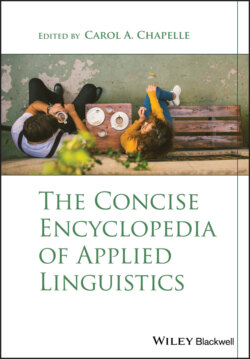Читать книгу The Concise Encyclopedia of Applied Linguistics - Carol A. Chapelle - Страница 174
Introduction
ОглавлениеThe role attention plays in the learning process has almost always been assumed since the earliest studies in the field of second language acquisition (SLA). Any exposure, be it aural or written, manipulated or authentic, to the foreign or second language (L2) is arguably premised on the role of attention on the part of the learner. The SLA field up to the mid‐1990s had generally assumed that experimental conditions (instruction or exposure, be it explicit, that is, with awareness, or implicit, that is, without awareness) elicited the required attention paid to the targeted item(s) in the L2 input. This premise is evidenced in the type of research design employed in the studies, which was the classical pretest—experimental condition—posttest design, without any concurrent or online data on learners' actual attention paid to the targeted items in the input.
The early postulations of Schmidt (1990) and Robinson (1995a) in SLA, and Tomlin and Villa (1994) from the field of cognitive science, regarding the roles of attention and awareness in input processing arguably propelled several researchers to probe deeper, both methodologically and empirically, into the constructs of attention and awareness. As Schmidt (2001) pointed out, it is quite challenging to separate these two constructs given that in psychology they are commonly viewed as being intrinsically integrated. While the role attention plays is relatively noncontroversial in most research fields that include cognitive psychology, cognitive science, and SLA, whether awareness plays a role in learning remains highly debated in all these fields.
This entry presents a concise review of the important tenets of the several major theoretical approaches that have postulated roles for both the constructs of attention and awareness in L2 learning at the initial stage of language processing (e.g., Schmidt, 1990, 1993, 2001; Tomlin & Villa, 1994; Robinson, 1995a; Leow, 2015a). A report of empirical studies premised on some role for attention/noticing is presented followed by those that have isolated the construct of awareness to investigate its effects on L2 learning. Finally, studies in SLA that have empirically probed deeper into the construct of unawareness will be reported and suggestions made for future research directions.
